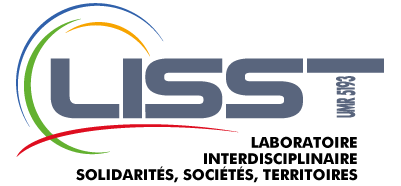-
Partager cette page
Terre de Liens, un levier foncier militant au service d’un projet politique pour l’agriculture
Publié le 20 février 2020 – Mis à jour le 24 juillet 2020

Pascal LOMBARD ● Doctorant, UMR LISST-DR, Université de Toulouse Jean Jaurès lombard.pascal@yahoo.fr
Adrien BAYSSE-LAINÉ ● ATER, Université de Cergy-Pontoise (EA MRTE) ; Docteur associé EA LER, Université Lumière Lyon 2 et UMR Innovation, INRA Montpellier
abl@posteo.eu
Depuis 2003, le réseau Terre de Liens (TDL) propose de considérer le foncier agricole comme un bien commun, objet de soins et de luttes. Par un processus singulier d’acquisition et de gestion collective de fermes, TDL vise la sortie à long terme de la terre hors du cadre de la propriété individuelle et du marché foncier spéculatif. L’article interroge le renouvellement des pratiques de gestion foncière porté par TDL, par ailleurs en quête de légitimation vis-à-vis des acteurs institutionnels. À partir de quelles valeurs et avec quels outils le réseau conduit-il ses actions relatives au foncier ? Comment transforme-t-il la prise en compte des questions foncières à l’échelle de territoires ? Les résultats montrent que la charte de TDL et le discours de deux de ses leaders nationaux s’appuient sur des valeurs dites citoyennes, qui entrent en rupture avec des valeurs paysannes, en termes de propriété du foncier et de prise de décision quant à sa gestion. TDL déconstruit le rapport dualiste propriétaire-fermier en y intégrant des acteurs tiers (citoyens bénévoles). En s’appuyant sur ses fermes pour porter un projet politique, le réseau construit une « territorialité du commun », centrée autour de pratiques de « gestion patrimoniale » du foncier et du bâti agricole.
MOTS-CLÉS : bâti agricole, commun, foncier agricole, réseau sociotechnique, territoire
Terre de Liens, a land-related activist device serving a political project for agriculture
Since 2003, the Terre de Liens (TDL) (Land of Links) network has promoted a vision of agricultural land as a common good, an object of care and struggles. It aims to leave behind the individual private land ownership framework and the speculative land market through the collective acquisition and management of farms. The network targets peasant farming and human-sized farms. This article examines the way in which TDL opens new avenues in managing land, while at the same time looking for legitimacy in the eyes of institutional actors. On what ideological basis and with what tools does the network buy, distribute, and manage land? How does TDL participate in (re)framing land issues at the local level? Results show that the charter of TDL and the discourse of two of its national leaders rely on so-called “citizen” values, which break with traditional peasant values, in terms of land ownership and land management. TDL deconstructs the dualist relationship between landowner and farmer by including third-party actors (volunteer citizens). Building on the “patrimonial management” of its farmland and farm buildings, the network is spearheading a political project around a “common territoriality.” (JEL: Q 15)
KEYWORDS: farm building, common, agricultural land, sociotechnical network, territory
Article paru dans : Économie rurale, n°369 | 83-101.
Adrien BAYSSE-LAINÉ ● ATER, Université de Cergy-Pontoise (EA MRTE) ; Docteur associé EA LER, Université Lumière Lyon 2 et UMR Innovation, INRA Montpellier
abl@posteo.eu
Depuis 2003, le réseau Terre de Liens (TDL) propose de considérer le foncier agricole comme un bien commun, objet de soins et de luttes. Par un processus singulier d’acquisition et de gestion collective de fermes, TDL vise la sortie à long terme de la terre hors du cadre de la propriété individuelle et du marché foncier spéculatif. L’article interroge le renouvellement des pratiques de gestion foncière porté par TDL, par ailleurs en quête de légitimation vis-à-vis des acteurs institutionnels. À partir de quelles valeurs et avec quels outils le réseau conduit-il ses actions relatives au foncier ? Comment transforme-t-il la prise en compte des questions foncières à l’échelle de territoires ? Les résultats montrent que la charte de TDL et le discours de deux de ses leaders nationaux s’appuient sur des valeurs dites citoyennes, qui entrent en rupture avec des valeurs paysannes, en termes de propriété du foncier et de prise de décision quant à sa gestion. TDL déconstruit le rapport dualiste propriétaire-fermier en y intégrant des acteurs tiers (citoyens bénévoles). En s’appuyant sur ses fermes pour porter un projet politique, le réseau construit une « territorialité du commun », centrée autour de pratiques de « gestion patrimoniale » du foncier et du bâti agricole.
MOTS-CLÉS : bâti agricole, commun, foncier agricole, réseau sociotechnique, territoire
Terre de Liens, a land-related activist device serving a political project for agriculture
Since 2003, the Terre de Liens (TDL) (Land of Links) network has promoted a vision of agricultural land as a common good, an object of care and struggles. It aims to leave behind the individual private land ownership framework and the speculative land market through the collective acquisition and management of farms. The network targets peasant farming and human-sized farms. This article examines the way in which TDL opens new avenues in managing land, while at the same time looking for legitimacy in the eyes of institutional actors. On what ideological basis and with what tools does the network buy, distribute, and manage land? How does TDL participate in (re)framing land issues at the local level? Results show that the charter of TDL and the discourse of two of its national leaders rely on so-called “citizen” values, which break with traditional peasant values, in terms of land ownership and land management. TDL deconstructs the dualist relationship between landowner and farmer by including third-party actors (volunteer citizens). Building on the “patrimonial management” of its farmland and farm buildings, the network is spearheading a political project around a “common territoriality.” (JEL: Q 15)
KEYWORDS: farm building, common, agricultural land, sociotechnical network, territory
Article paru dans : Économie rurale, n°369 | 83-101.




